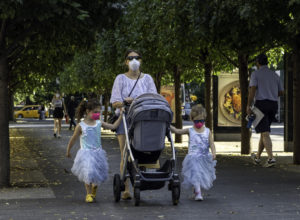Almost 40 percent of New York City parents are hesitant to vaccinate their young children for COVID-19, according to a new study by researchers at the CUNY Graduate School of Public Health and Health Policy (CUNY SPH).
For the study, which was published Thursday in the American Journal of Public Health, Assistant Professor Chloe Teasdale and colleagues surveyed 2,506 New Yorkers with kids ages five to 11 years, two weeks after the FDA granted emergency use authorization of COVID-19 vaccines for school-aged children. In the representative survey, 12 percent reported that their child was already vaccinated and 51 percent reported being very or somewhat likely to get their child vaccinated. The survey also showed that eight percent of parents were not sure and 29 percent of parents reported they were not very likely or not at all likely to vaccinate their child.
The findings are consistent with a March 2021 survey, also conducted by CUNY SPH researchers, and suggest that many New York City parents may not vaccinate their children for COVID-19. Also consistent with previous studies, 89 percent of vaccine-hesitant parents (those saying they were unsure, not very likely, or not at all likely to vaccinate their child) cited safety concerns as the reason for their hesitancy and 78 percent reported concerns about the effectiveness of the COVID vaccines.
This is concerning, says Teasdale, an Investigator at the CUNY Institute for Implementation Science in Population Health (ISPH), but the findings also yield information that can inform efforts to increase vaccine acceptability. One key result is that more than half of vaccine-hesitant parents do not believe children need COVID-19 vaccination, suggesting that greater awareness is needed about the risk of COVID-19 infection in children and their role in spreading the virus. The study also found that vaccine-hesitant parents were less likely to be vaccinated themselves, more likely to have not voted or to have voted for the Republican candidate in the 2021 NYC mayoral election, and to be from Staten Island. A novel finding is that children of vaccine-hesitant parents were not less likely to have received routine vaccination (required for school-attendance) but were more likely to have not received flu vaccination. These findings suggest that mandates may be key for increasing COVID-19 vaccine coverage in children.
Enhanced efforts to increase parental awareness about the safety and efficacy of COVID-19 vaccination are needed in order to foster vaccine confidence, acceptance, and uptake, the authors say.
“It’s been six months since the CDC recommended use of the Pfizer COVID-19 vaccine for five to 11 year olds but currently only 40 percent of kids have been fully vaccinated in NYC,” says Teasdale. “We need to do a lot more to get all school-aged kids vaccinated in order to protect them from infection and prevent severe disease. We hope that our findings with contribute to those efforts.”
“COVID-19 Vaccine Coverage and Hesitancy Among New York City Parents of Children Aged 5-11 Years,” Chloe A. Teasdale, Scott Ratzan, Lauren Rauh, Hannah Stuart Lathan, Spencer Kimball, Ayman El-Mohandes, American Journal of Public Health, April 14, 2022. doi: 10.2105/AJPH.2022.306784.
For media inquiries contact:
Ariana Costakes
Communications Editorial Manager
CUNY Graduate School of Public Health and Health Policy
[email protected]
About the Institute for Implementation Science in Population Health at the City University of New York
The CUNY Institute for Implementation Science in Population Health (ISPH) was founded on the notion that substantial improvements in population health can be efficiently achieved through better implementation of existing strategies, policies, and interventions across multiple sectors. We study how to translate and scale-up evidence-based interventions and policies within clinical and community settings in order to improve population health and reduce health disparities. CUNY ISPH. Pursuing population health gains through better implementation. www.cunyisph.org. Follow us on Twitter: @CUNYISPH.
About the CUNY Graduate School of Public Health and Health Policy
The CUNY Graduate School of Public Health and Health Policy (CUNY SPH) is committed to promoting and sustaining healthier populations in New York City and around the world through excellence in education, research, and service in public health and by advocating for sound policy and practice to advance social justice and improve health outcomes for all. For more information, visit sph.cuny.edu.
